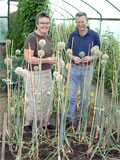HDRA welcomes EC organic vegetable seed treatment project
By Roberts SJ, 01 Jul 2004
HDRA joins EC project on Seed Treatments for Organic Vegetable Production (STOVE ), taking over the responsiblities, and safeguarding the work, previously assigned to HRI, prior to its take-over by the University of Warwick. With the current changes to the organic farming regulations with respect to the use of organic and non-organic seeds, the issue of seed health has become critical for some organic vegetable producers. The development of new techniques for seed sanitation and the control of seed-borne diseases is now more urgent than ever and is of interest to both producers and users of organic vegetable seeds. The STOVE project, led by the Federal Biological Research Centre for Agriculture and Forestry, Braunschweig, Germany, involves seven EU partners and is examining the potential of a range of physical and biological seed treatments for the control of seed-borne fungi and bacteria on a number of different vegetable crops, including beans, brassicas, carrots, parsley and basil. Physical seed treatments, such as hot air or hot water, and treatments with plant extracts, disease suppressive micro-organisms and disease resistance inducing agents will be trialled on their own or in combinations (see www.stove-project.net for further details). STOVE is a three-year project, which started in 2003. As it enters its second year it has been agreed that HDRA should become involved as the UK partner taking over the responsibilities previously assigned to HRI Wellesbourne. Plant pathologist Dr Steve Roberts will continue as principal researcher on the project as he has now teamed up with the researchers at HDRA. Dr Margi Lennartsson, Director of Research and Development at HDRA, said "I am very pleased that HDRA has become a partner in this project and thereby ensured the continued involvement by the UK. The issue of seed-borne diseases is clearly very important for some organic vegetable crops and effective control measures needs to be found. Dr Steve Roberts complements HDRA's research team very well and he will strengthen our expertise in this area." Alan Schofield, Growing with Nature, Lancashire , added "I believe the STOVE project has great potential for developing new and exciting techniques for controlling some of the difficult diseases in organic vegetables. I just wished the problem with leaf spot (Septoria apiicola) on celery could be added to the investigation as this is a big problem for me and many other organic growers at the moment." For further information contact: Dr. Steve Roberts s.roberts at planthealth.co.uk Dr. Margi Lennartsson, mlennartsson@hdra.org.uk www.hdra.org.uk www.stove-project.net STOVE Project Summary: Due to the difficulty in organic farming of producing pathogen-free seeds, and the lack of simple, effective non-chemical methods for seed sanitation, a substantial part of the seed used by European organic vegetable growers is still derived from conventional production. However, this ruling of the EU Organic Farming Regulation 2092/91 is set to change and in future the use of conventional seeds by organic growers will become more and more restricted. In the project two new physical seed treatment methods will be tested in relation to the traditional method of hot water treatment. Agents of natural origin acceptable to organic farming will be evaluated and combined with the physical methods. This will be complemented by studies on physiological factors determining seed sensitivity, which is in many cases limiting the application of physical seed treatments. The aim of the project is to improve the currently available, non-chemical methods for control of seed-borne vegetable pathogens and to develop new methods acceptable to organic farming.
Tags: STOVE seeds treatment
